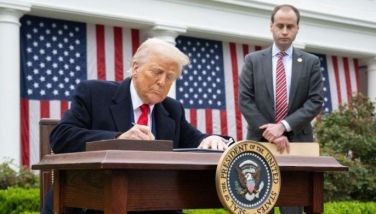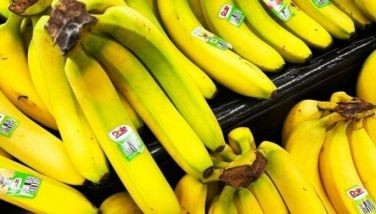New Year food for thought

Some food for thought for the new year greet me. In the past year I had hoped to comment on some of the topics but had found no occasion to deal with them. Aside from the obvious, I discuss: (1) Brexit and the European Union and (2) the consequences of the “Arab Spring” on the failure of some nations.
New Year resolutions. We have many New Year resolutions. Some are detailed, others are simple statements. The best New Year resolution I have heard comes from Oprah Winfrey. She simply said, “My New Year resolution this year is to be resolute.”
That hits the nail on the head just right. What good is any resolution if somewhere and sometime, the will weakens and what is planned is forgotten?
Brexit, Europe and free trade. What happens with Brexit and the European Union (EU) would likely have little impact on the Philippine economy. The disruption of economies would be mainly among the EU member countries.
Whatever is the volume of overall EU trade and investment relations with the Philippines will essentially be fragmented into their EU and UK components, and essentially, that will remain to be the overall separate effect on the country.
If Brexit truly materializes as planned, the Philippine economy is likely to experience an increased effort on the part of the UK to create more economic and business agreements with us. This is designed to increase trade and investments between the two countries with the object of surpassing their past performance.
This will not be unique to the Philippines. To assure its own economic survival, the United Kingdom would redouble efforts with every country where it sees the potential for increased trade and investment in order to foster economic expansion after Brexit.
In general, the importance of Brexit to the outside world is to demonstrate the idea that there is a big cost toward departure from a comprehensive treaty of commerce and economic integration. Both parties, EU and UK want to continue the benefits of economic union because of the high economic integration that the two already enjoy under present circumstances.
To the British, Brexit is to have its cake (keep the benefits of union) and eat it too (leave the EU). However, the EU wants to keep the UK in the union, but if it leaves, it must demonstrate that there is a heavy price to pay for doing so. The higher the price that the UK perceives it will be for them, the greater is the chance that – perhaps – it would change its mind and not leave.
(Conversely, it is very difficult to get into such a treaty of economic union. On the road toward integration, the countries took long to decide that the benefits of economic union were much higher than the cost. That was why it has taken decades of effort for EU to reach the stage of union that they are in today. Having achieved that, they have also introduced safeguards against any member leaving the union.)
The question of Brexit was decided by the British electorate. The politicians have to implement the plan even if the United Kingdom, by virtue of the very nature of its open economy and its position in favor of free trade as a mantra of economic policy , wants to leave the European Union to be able to determine their own destiny – “take back its sovereignty” as it was argued in the debate on Brexit.
The United Kingdom and the EU are very well integrated economies. Because of this, both economies desire an orderly and somewhat less disruptive departure of the UK from the European Union.
This is easier said than done. To begin with, by entering a project being part of the European Union carries the responsibilities inherent in various entanglements of common economic and trade policies with respect to the member countries.
It is an irony that in order to leave the EU, what used to be books of regulations within the EU to which it had agreed to under treaty would now be introduced into their internal laws and regulations in order for UK to assure the EU that it would abide by the rules of trade in the larger community after Brexit. This means that EU laws to which UK had agreed under the EU treaty would be integrated in UK laws to reassure the EU that old relations would be respected.
This follows because the UK wants to retain the trade ties of free trade with Europe. Under such an arrangement, acquiescence to common trade rules would mean that the UK would have to put such rules explicitly in its own legal framework.
Even as this is the case, the current negotiations between the UK and EU would require a free trade treaty between the UK and EU that might take on a special flavor. The recent free trade agreement between Canada and UK is being examined as a possible template for this agreement between UK and EU.
In turn, if this UK-Canada trade treaty becomes a template for the post-Brexit trade relations, the EU finds a model for itself in devising trade relations with non-EU countries.
Arab spring 2014 and how nations fail. Authoritarian governments in the Middle East experienced a spring of open protests, disruptions and even revolutions, leading to the breakdown of state authority.
Today, Libya, Syria, Iraq, and Yemen are in ruins. Certain countries are under threat of greater instability in the region.
The varied results of these events included civil wars, repressions, tribal warfares, and anarchy in these countries. In turn, they have brought about the large loss of lives, the disruption of communities and societies, the mass migrations of displaced and affected citizens, the destruction of economic, social and political institutions and the nurturing of troublesome activities like terrorism.
Throughout 2018, these problems will continue to plague many countries. Although 2018 may bring out many messages of hope in many countries including in our own, the sad dramas of these other countries will remind us that there is trouble in our world, not necessarily in our backyard.
My email is: gpsicat@gmail.com. Visit this site for more information, feedback and commentary: http://econ.upd.edu.ph/gpsicat/
- Latest
- Trending

























